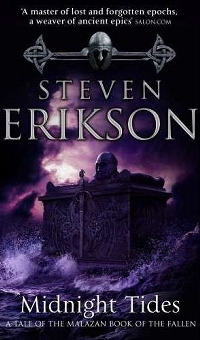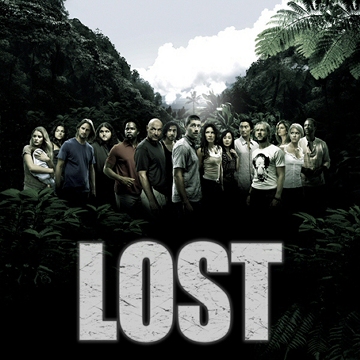 I’ve finished reading A Clash of Kings even if it didn’t show on my reading queue and I’m not going to “officially” review, but I wanted to write down some scattered comments about it and put some kind of content on the blog.
I’ve finished reading A Clash of Kings even if it didn’t show on my reading queue and I’m not going to “officially” review, but I wanted to write down some scattered comments about it and put some kind of content on the blog.
Overall I think it’s not a strong as the first book. Martin did a good job with it, but I think the merit is mostly on the first book, setting up really well all the various parts. Book 2 makes it more a task of running with the ball, and that’s well done. Something that I didn’t expect is that Martin jumps some events more than the first book. The PoVs dictate the flow and the scenes that don’t strictly belong to one are avoided even if they could be significant. I fear that moving on with book 3+ this will become an exception and Martin will feel compelled to bog in unnecessary detail. In fact I remember a recent interview where he said that if he could rewrite ACOK today he would put Robb PoV back in and describe directly the campaign (hint: this wouldn’t improve the book at all and I’d rely more in Martin’s past wit than his most recent…).
Most of the merits of this second book are about sticking to those PoVs and make the characters’ drama drive the story in a way that feels plausible. Some of the best chapters tell a self-contained mini-story that ranges between 8 and 20 pages. In this book Martin begins having a more cumbersome, heavy prose that sometimes indulges into lists of names or other things that one reads only to immediately forget, but being the chapter “chunks” rather short it still makes for a good flow. Every time one of these chapter closes you have the urge to know what happens next (and I often went to read the first pages on the same PoV, sometimes almost 200 pages ahead), and I don’t think anyone else gets this compelling reading formula better than Martin.
Characters are always well written and truly “grey”. I think this is an aspect often misdescribed. It’s not about making a character morally ambiguous, but about making it somewhat plausible. There are definitely “heroes” that Martin wants the reader to root for, taking sides actively. The book is NOT neutral. Its strength is in making it work. Arya, an heroine the reader is supposed to love and recognize/sympathize with, can murder some nameless guy. This is from one side coherent with the character and the truly unforgiving world, and from the other side the reader finds it acceptable. As if this case made the murder totally acceptable. Necessary in some way.
This contrasts with murder that is not necessary, and while considering this I noticed how Martin uses this device every time he seeks for a certain response and shock the reader with some unpredictable death (and there are MANY). What defines these deaths, that are supposed to move and shock the reader, is that they are usually unnecessary (and unexpected). The result of some hate, or spite or brutal violence. But not strictly necessary, it’s an exhibition of violence. That’s how some characters (like Arya) can still be readers’ favorite even when they do something controversial. And I think this prepares the path from some characters’ arc like Jaime. The trick is the PoV, when you get into a character and learn his motivations you get to understand and sympathize.
At the micro level you can appreciate how well written everything is, but at the macro level some evident shortcomings start to show. For example the “pinch” that is made by the two extreme sides that close on the story, Ice/Jon Snow and Fire/Daenerys, is very obviously lagging behind while the center (the clash of kings) is getting bloated out of proportions. It’s not surprising that Martin started to have problem managing the thing (“the story grew in the telling”), since it’s only this central part that gets bigger in comparison with the rest. Daenerys PoV is a total of 60 pages in a book of 950, and in those few pages she’s basically idling or chasing after prophecies that are used to foreshadow how the story develops. Jon PoV is about 100 pages, but it’s mostly all preparation and flavor, used simply to move Jon to a new position. These two PoVs go together because they are disengaged from the rest of the story. They are like side-plots that wait to converge in some later book.
Another observation about the macro level is that the book is filled with Deus Ex Machina. I know people complain about this in Erikson’s books, but if you accept that kind of broad definition of DEM, then Martin have aplenty in this book, and all at crucial points of the story. To begin from the obvious: Melisandre.
In a world soaked in deceit and betrayal, she’s immune to both (the Prologue, to begin with). I guess Martin “has plans” to rule her in the later books, but within this one she’s a personified DEM for the simple reason that all the rules that apply to other characters DO NOT APPLY to her. Being a DEM personified she also leads to crucial DEMs in the plot. She can make prophecies that are NOT revealed as delusions. They really work. She has the DEATH SPELL. When I read that part I was absolutely sure that Martin was tricking me, but he wasn’t. In a world that establishes itself as “low on magic”, so that everything comes down to men and their affairs, she can simply “wish” that someone dies, and they do. At least in the Malazan world the power is in check. An action triggers a reaction, and it’s the power itself being a delusion. I don’t remember anyone dispatched as easily. But here nothing exists to keep the balance. She proceeds by killing a core character and another relevant one. Without these two deaths the WHOLE story would have spun in a totally different direction. About as much as dramatic as that certain death in book 1. And this huge plot bend is entirely a Deus ex Machina. Death spell, no saving throw. In a world with no magic and with kings being the show runners, being able to pick one and kill him in an instant is the exact equal of an I-WIN button.
It’s kind of ridiculous that when matters get serious and she can be used to easily win the war (and kill someone not made into a redshirt) she’s sent away with an excuse: “Your Grace, if the sorceress is with us, afterward men will say it was her victory, not yours. They will say you owe your crown to her spells”. The point being she’s one step away from breaking the whole story, and Martin has to rely on this artificial trick to limit the power he gave to her. Yet, she steps out and the other major DEM enters the picture: wildfire.
This is a sort of “magic” fire, whose DEM potential lies entirely in the fact that, being magic, no one anticipates it (well, Davos does, but only so much as to the lead to the powerless Big “No!” trope). It really gives this feeling of “magic entering the world” and subverting everything, a meta-device that enters the picture to make it change the natural course. On the micro level you have the character dramas that are written very well and work perfectly (in their big-picture-irrelevant stories), but on the bigger level there’s the whole war on the continent and the clash of kings. EVERYTHING on this level is artificially steered through all these Deux ex Machina. First Melisandre changing the course by killing two key characters by wishing it, and then by wildfire, whose power of subversion simply turns around the outcome of the biggest battle in the whole arc of the first two books.
A third major DEM comes with Jon, who has a magic dream (by the way, this book is filled with dream sequences, and I wonder why I don’t see them criticized as similar scenes in other books) that shows him what they are going to find, and so he’s able to save the whole company by making them turn around. Magic dream = magic rescue. A classic Deus ex Machina.
Now you can tell me that there’s very little magic in this world, but Martin has used it in the WORST way possible. By steering artificially the plot whenever something truly major was about to happen. Makes it feel the plot is on a leash. And yet it works, because the characters are so well written and relatively safe within their smaller cocoons of plot. It gives an idea of a complex world because it’s as if the main PoVs are caught in the events and not controlling them, which is the way “reality” usually feels. They try to survive while pieces more around them. Martin is the god moving the pieces from out of the picture, but at least he stays true to the characters.

 In the last few months I’ve deliberately juggled writers to juxtapose the most different styles. Jumping between Abercrombie, Glen Cook, Martin, Erikson, Donaldson, Gene Wolfe. And especially reading twenty pages of Erikson and then immediately moving to read twenty pages from Martin’s “A Clash of Kings” (that I’m reading also because I want to clear the book before the TV show starts), and the opposite, from Martin to Erikson. As I said, since I can’t analyze, I need this so I can understand how it “feels”. Because I believe there’s something quite relevant that I’m missing and so that is hard to describe.
In the last few months I’ve deliberately juggled writers to juxtapose the most different styles. Jumping between Abercrombie, Glen Cook, Martin, Erikson, Donaldson, Gene Wolfe. And especially reading twenty pages of Erikson and then immediately moving to read twenty pages from Martin’s “A Clash of Kings” (that I’m reading also because I want to clear the book before the TV show starts), and the opposite, from Martin to Erikson. As I said, since I can’t analyze, I need this so I can understand how it “feels”. Because I believe there’s something quite relevant that I’m missing and so that is hard to describe.  It’s an interesting observation because it consequently leads to something else. I believe that Martin writes in a style that is strongly “outward”. It’s what I notice the most in everything, from descriptions to characterization. Martin is colorful and explicit. He’s not “unsubtle”, since the characters have admirable depth, but it’s still a style of characterization that I define as outward. Reaching out, to expression and the reader. Spoken sincerely, but manifest and specific.
It’s an interesting observation because it consequently leads to something else. I believe that Martin writes in a style that is strongly “outward”. It’s what I notice the most in everything, from descriptions to characterization. Martin is colorful and explicit. He’s not “unsubtle”, since the characters have admirable depth, but it’s still a style of characterization that I define as outward. Reaching out, to expression and the reader. Spoken sincerely, but manifest and specific.

